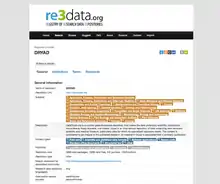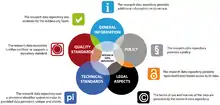Registry of Research Data Repositories
The Registry of Research Data Repositories (re3data.org) is an Open Science tool that offers researchers, funding organizations, libraries and publishers an overview of existing international repositories for research data.
 The logo of re3data.org, the online Registry of Research Data Repositories | |
Type of site | Online registry |
|---|---|
| Available in | English |
| Owner | Karlsruhe Institute of Technology, GFZ German Research Centre for Geosciences, Berlin School of Library and Information Science |
| URL | www |
| Commercial | no |
| Registration | none |
| Launched | May 28, 2013 |
| Current status | Online |
Content license | Website: CC-BY, Database: CC0 |
Background
re3data.org is a global registry of research data repositories from all academic disciplines. It provides an overview of existing research data repositories in order to help researchers to identify a suitable repository for their data and thus comply with requirements set out in data policies.[1] The registry was officially launched in May 2013.[2]
Content
In July 2019 the registry lists 2361 research data repositories from around the world covering all academic disciplines. They are described in detail using the re3data.org schema.[3] The service makes all metadata in the registry available for open use under the Creative Commons deed CC0.[4]

Features
The majority of the listed research data repositories are described in detail by a comprehensive schema, namely the re3data.org Schema for the Description of Research Data Repositories.[5] Information icons support researchers to identify an adequate repository for the storage and reuse of their data.[2][6]

Inclusion criteria
A repository is indexed when the minimum requirements for inclusion in re3data.org are met: the repository has to be run by a legal entity, such as a sustainable institution (e.g. library, university) and clearly state access conditions to the data and repository as well as the terms of use. Additionally, an English graphical user interface (GUI) plus a focus on research data is needed.[5]
Partners and cooperation
re3data.org is now a regular service of DataCite. It has been a joint project of the Berlin School of Library and Information Science, the GFZ German Research Centre for Geosciences and the Library of the Karlsruhe Institute of Technology (KIT). The project has been funded by the German Research Foundation (DFG).[1] The project cooperates with other Open Science initiatives like Databib,[7] BioSharing,[8] DataCite[9] and OpenAIRE.[10] Several publishers, research institutions and funders refer to re3data.org in their Editorial Policies and guidelines as a tool for the identification of suitable data repositories, e.g. Nature,[11] Springer[12] and the European Commission.[13]
References
- Pampel, Heinz; Vierkant, Paul; Scholze, Frank; Bertelmann, Roland; Kindling, Maxi; et al. (4 November 2013). "Making Research Data Repositories Visible: The re3data.org Registry". PLOS One. 8 (11): e78080. Bibcode:2013PLoSO...878080P. doi:10.1371/journal.pone.0078080. PMC 3817176. PMID 24223762.
- Wellander, Janna (4 June 2013). "Registry of Research Data Repositories launched – re3data.org". SPARC Europe. Retrieved 5 February 2014.
- "re3data.org – About". re3data.org. 19 July 2019. Retrieved 19 July 2019.
- "DataCite, re3data.org, and Databib Announce Collaboration". re3data. Retrieved 25 March 2014.
- Vierkant, Paul; Spier, Shaked; Rücknagel, Jessika; et al. (2013). "Schema for the description of research data repositories". GFZ Helmholtz-Zentrum Potsdam. doi:10.2312/re3.004. Retrieved 7 February 2014.
- Fenner, Martin. "registry of research data repositories launched". PLOS Blog. Gobbledygook. Retrieved 5 February 2014.
- Kratz, John; Nicholls, Natsuko (3 March 2014). "Finding Disciplinary Data Repositories with DataBib and re3data". Data Pub. Retrieved 21 March 2014.
- "Databases". biosharing. Retrieved 5 February 2014.
- "Resources". DataCite. Archived from the original on 9 February 2014. Retrieved 5 February 2014.
- "re3data.org and OpenAIRE sign Memorandum of Understanding". OpenAIRE. 21 October 2013. Retrieved 5 February 2014.
- "The paper trail". Nature. 498 (7452): 5. 4 June 2013. doi:10.1038/498005a. PMID 23745194. Retrieved 5 February 2014.
- "About SpringerPlus - Editorial policies". SpringerPlus. Retrieved 5 February 2014.
- "Guidelines on Open Access to Scientific Publications and Research Data in Horizon 2020" (PDF). European Commission. Retrieved 20 March 2014.
